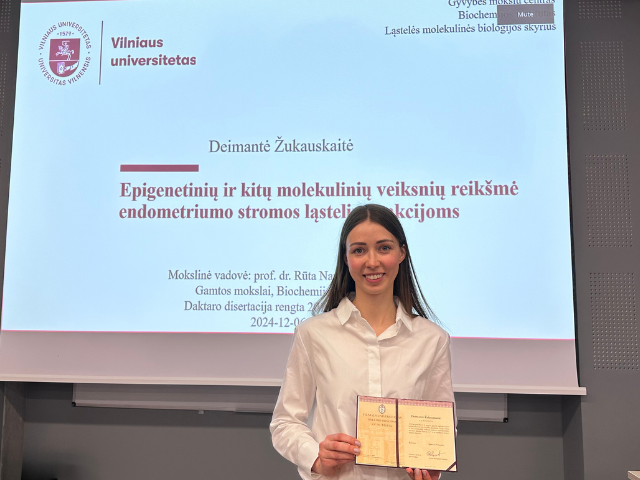Deimantė Žukauskaitė has defended her thesis entitled "Investigating the role of epigenetic factors and their alterations in the functioning of the female reproductive system" for the degree of Doctor of Science in Biochemistry.
 |
The scientific supervisor is Prof. Dr. Rūta Navakauskienė (Vilnius University, Natural Sciences, Biochemistry);
Composition of the Dissertation Defense Board:
Chairperson - Prof. Habil. Dr. Juozas Rimantas Lazutka (Vilnius University, Natural Sciences, Biology); Prof. Dr. Dalia Baršytė-Lovejoy (Toronto University, Canada, Natural Sciences, Biochemistry); Dr. Augustas Pivoriūnas (Innovative Medicine Centre, Natural Sciences, Biochemistry); Assoc. Prof. Dr. Aušra Sasnauskienė (Vilnius University, Natural Sciences, Biochemistry); Dr. Egidijus Šimoliūnas (Vilnius University, Natural Sciences, Biochemistry).
Successful implantation depends not only on the quality of the embryo but also on the state of readiness of the endometrium, the lining of the uterus. During the preparation of this thesis, changes in epigenetic and other molecular factors of endometrial stromal cells (ESCs) during decidualization and in response to the embryonic secreted factor chorionic gonadotropin (hCG) were analyzed. H4hyperAc levels were found to be specifically increased in the promoter regions of decidualization-related genes (WNT4, HAND2, STAT5A), while DNA methylation levels in these regions remained unchanged. We also confirmed that the essential characteristics of mesenchymal stromal cells are not altered in ESLs isolated from thawed endometrial tissue after deep freezing. However, changes in the DNA methylation level and the factors regulating this modification (DNA methyltransferases) were detected in these cells. The study showed that hCG exposure enhances endometrial functioning by increasing the levels of H3K27Ac in decidual (FOXO1) and implantation (HOXA10, HAND2) related genes and by altering the levels of ESL-secreted miRNAs in the lining of the lining of the lining of the lining vesicle. The assessment of changes in molecular factors during ESL decidualization revealed the relevance of these changes to physiological and pathological processes in the endometrium, which enables the identification of diagnostic and therapeutic strategies for diagnosing and treating infertility.
